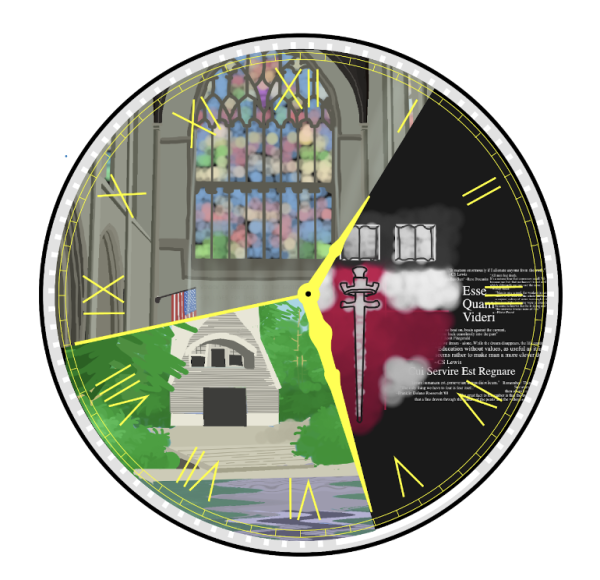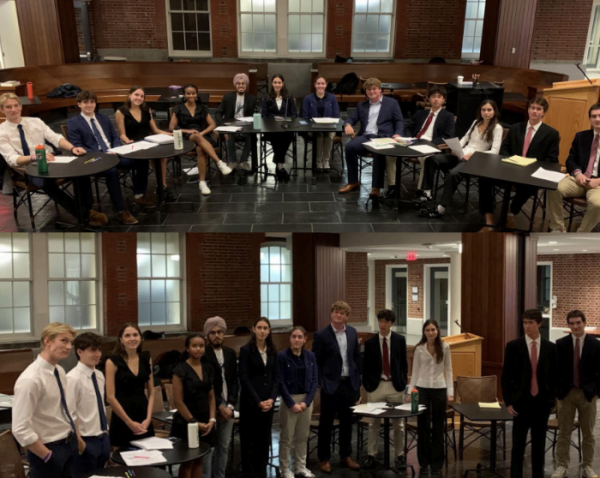Student Preachers Take the Pulpit on Holy Days
On two important days in the Christian Advent season, students who attended chapel services were preached to not by a minister but rather by their peers. Chaplain Christopher Whiteman decided to create a new opportunity for Groton students to expand their religious experience by asking students to deliver sermons to the congregation last spring. Although sermons delivered by members of the congregation are common in the Episcopal Church – typically happening about twice each year in Mr. Whiteman’s experience – the practice had previously not existed at Groton.
The practice begun in the 2016-17 school year. Rev. Whiteman approached Lwazi Bululu ’20, then in his confirmation class, about preaching on Good Friday last spring. He reasoned that the Good Friday service – attended by fifteen to forty students, rather than the almost-two-hundred that attend weekend chapel service – would be an opportune occasion to test the waters for alternate speakers without disrupting the weekly Sunday services.
Rev. Whiteman says that the initial hope was to add fresh voices to the services because “we believe theologically that the Spirit speaks to each one of us, so people are going to have different perspectives.” He also intended to democratize the voice from the pulpit, reflecting that “in the past, too much power was placed in the hands of the clergy, and that power has been abused.”
“Clergypeople are people with special jobs within the community, but they are not above any member of the community,” says Rev. Whiteman.
He went on to say that presenting the voices of laypeople also fosters greater spiritual equality. Further, in an environment that does not offer abundant opportunities for students to express their faith, engaging students in the process of preaching offers a venue for such expression.
The program continued this year. Lilias Kim ’19 spoke on Good Friday, and Andrew Rasetti ’18 and Paul Malone ’18 on Maundy Thursday, both significant days of the Advent season in many Christian denominations.
Lilias spoke about an encounter with a taxi driver through whom she felt the spirit of God flowing. Andrew and Paul gave their sermon together, responding to each other’s interpretations back and forth in a decidedly unorthodox approach. They interpreted the story of Jesus washing his disciples’ feet through their own stories of enduring a grandfather’s death and of a generous dirt bike rider who, without reward, took hours from his own life to help a group of children learn how to jump their bikes.
The verdicts of the audiences have been almost uniformly positive. Reverend Whiteman says that many faculty members have told him how much they enjoy students’ preaching. He himself praised the “attentiveness and thoughtfulness to their preparation” which the students devoted to their sermons.
John Rogers ’22, who attended and liked both student sermons, enjoys the occasional younger perspective. He says he enjoys seeing “how [student preachers] perceive certain religious holidays and how they connect with their experiences.”He believes that student sermons should be kept occasional, though, noting that students have a similar, if secular, chance to express themselves in chapel talks.
Lwazi believes the audience’s connection can be greater when “someone from within the congregation [is] giving the sermon instead of the priest, who we see as a person who just knows the scripture very well.” A different speaker, he says, can break the monotony of a repeated ritualistic service and “gives the students the opportunity to engage more,” which in turn can encourage religious students in a world where religion is less emphasized than in the past.
After Lwazi’s sermon, several students asked him whether there would be an opportunity for them to preach in the future. Rev. Whiteman is keen to continue student sermons, and depending upon popular demand and the supply of committed preachers, will increase or retain the program at the same size.





